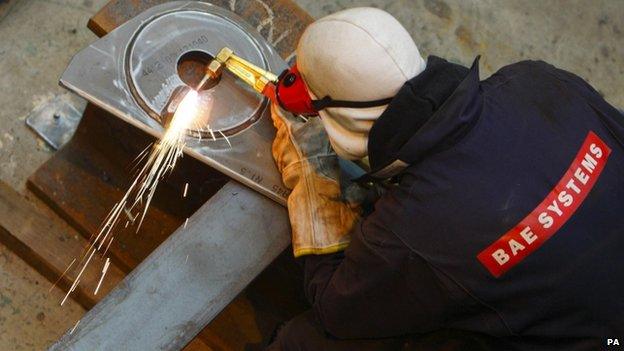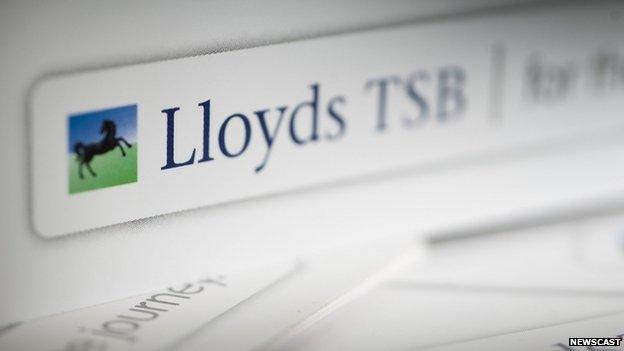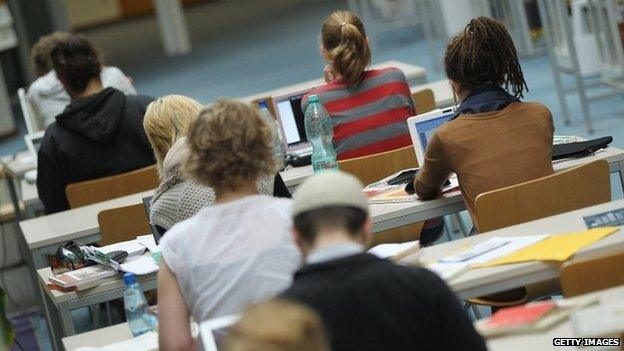Scottish independence: Should the CBI be worried about a Yes vote?
- Published
Business body the Confederation of British Industry (CBI) said it was concerned, external about the knock-on effect a Yes vote could have on defence; financial services; energy; food and drink and higher education. The BBC's Marianne Taylor and Jamie Ross examine these five areas to see who has voiced worry and who has expressed hope.

1. Defence

The Scottish government would remove Trident nuclear weapons from the Clyde and establish a Scottish Defence Force with 15,000 full-time personnel and 5,000 reservists in the event of independence.
The money saved from Trident would be spent on childcare, First Minister Alex Salmond has said.
However, in a paper on defence in an independent Scotland, UK Defence Secretary Phillip Hammond, external said thousands of jobs would be lost and that defence of the UK would be harmed.
Defence contractors such as BAE and Babcock have also raised concerns about independence.
BAE said the Union "offered greater stability", while Babcock said a "Yes" vote could lead to "risk and uncertainty".
More reading....

2. Financial Services

A number financial institutions, including Lloyds, Barclays and Standard Life have raised concerns about independence. They have asked questions about tax and regulatory systems, the currency and EU membership.
The Scottish government's White Paper has proposed cutting corporation tax and to share with the rest of the UK the Bank of England and some financial regulation services.
It also laid out plans to continue using sterling in a currency union with the rest of the UK, a position the UK Chancellor George Osborne and the other main Westminster parties have ruled out.
Governor of the Bank of England Mark Carney said a currency union would require some ceding of sovereignty in the event of an independent Scotland.
Credit ratings agency Standard and Poor's, external said it could be beneficial to an independent Scotland if the size of its financial sector was reduced.
More reading..
Standard Life quit plan sparks row

3. Energy

Oil and gas is central to the independence debate, with the Scottish and UK governments setting out competing visions for its future.
Both have accepted the recommendations of retired businessman Sir Ian Wood's report, external on the future of North Sea oil and gas.
Critics of independence claim an independent Scotland would be too reliant on volatile revenues from oil. The Scottish government disagree, saying the two oil funds it plans to create following a "Yes" vote would ensure the economy coped with such volatility and save for future generations.
Elsewhere, pro-Union supporters claim energy bills would rise in an independent Scotland, while the Scottish government says costs for consumers would go down as Scotland's markets for green energy expanded following independence.
More reading....

4. Food and Drink

Scotland has a big food and drink industry which is seeing rising exports and an annual turnover of around £12.4bn.
The Scottish government's White Paper, external said that the UK's proposed EU referendum presents a threat to this growing industry, as it would risk losing the backing of the EU's trade agreements.
Moreover, 18% of Scotland's overseas exports are in food and drink, as opposed to 1.5% for the UK as a whole, so the Scottish government say that an independent Scotland could prioritise the industry.
However, the UK government's paper on business, external implications of independence says that Scotland's food and drink sector exports £24.5bn of annual exports to the rest of the UK, and independence would risk the continuity of that market.
More reading....

5. Higher Education

In 2011/12, there were 167,365 full-time students in Scottish higher education institutions, with five universities in the world's top 200.
The UK government say, external that this is only possible through UK funding, stressing that Scotland secures 13.1% of the UK total of research grants, while only accounting for 8% of UK GDP, or 8.4% of the UK population.
However, the Scottish government has, external criticised the UK government's "increasingly market-driven approach to higher education". It says that in an independent Scotland, Scottish students would continue to get free access to higher education, while continuing to charge students from the rest of the UK.
Academics Together, external, a pro-Union group, say this would cause a massive funding gap. However, Academics For Yes, external say a "No" vote risks cuts in the Scottish block grant, and loss of access to EU funding.
More reading....